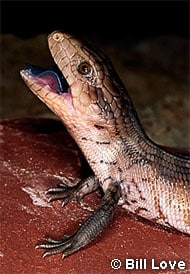Description:
For a member of the skink family, blue-tongued skinks are among the best suited for lives in captivity for several reasons. Being relatively slow-moving, they’re not as difficult to handle compared to most of the slender skink species. Blue-tongued skinks’ short, thick physique makes them easy to hold, even by children. Although a biter is occasionally encountered, most adult blue-tongued skinks are loathe to even open their mouths, much less show off their startlingly fat, blue tongues that earned them their common name. A 60-gallon long aquarium should be considered minimal housing for one specimen. Nearly any substrate from sand to pebbles to aspen provides blue-tongued skinks an adequate material to wander about in. A simple shelter of stone or a concave piece of wood will serve as a hide box. Blue-tongued skinks should have a small bowl of water available at all times. They may also receive needed moisture from pieces of fruit or other vegetation, which makes up the bulk of their diet. Crickets and various kinds of worms are also savored, and baby mice are loved too. No climbing branches are needed because blue-tongued skinks seldom leave the ground. Avoid temperatures below the upper 60s Fahrenheit for these warmth-loving animals. T. scincoides bears four to 10 live young, each resembling miniature adults. The young should be treated just like adults for their basic care. Litters of young should be housed in separate units to avoid bickering over food, and to avoid the possible loss of digits from aggressive nipping. For more information, read our detailed blue-tongued skink Care Sheet.
Habitat:
An inhabitant of fields and lightly forested areas.
Range:
Northeastern Australia and the island of New Guinea.
Scientific Name: Tiliqua scincoides
Species Group: skink
Family: Scincidae
Size: 12 to 16 inches
Level: beginner
Weight: N/A
Dangerous: No



